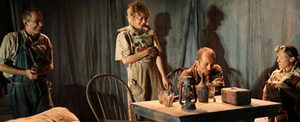SITE GUIDE
SEARCH
REVIEWS
REVIEW ARCHIVES
ADVERTISING AT CURTAINUP
FEATURES
NEWS
Etcetera and
Short Term Listings
LISTINGS
Broadway
Off-Broadway
NYC Restaurants
BOOKS and CDs
OTHER PLACES
Berkshires
London
California
New Jersey
DC
Philadelphia
Elsewhere
QUOTES
TKTS
PLAYWRIGHTS' ALBUMS
LETTERS TO EDITOR
FILM
LINKS
MISCELLANEOUS
Free Updates
Masthead
A CurtainUp Review
Last Man Club
By Zoe Erwin-Longstaf
| “Maybe. You never know when something’s going to end.”— Pogord contemplating life after the storm.
|
 Spencer Aste, Britt Genelin, David Crabb, and Lynn Mancinelli (Photo: Dixie Sheridan) |
We are not eased into the world of these characters. Their ticks, oddities, and perversities are not presented in any kind of clarifying or measured way. Rather, their exchanges are quick, stunted and confusing and are foisted upon us with all their absurdities. Still, despite the volatility of the characters' moods and the rapidity of their speech, the presentation manages to unfold at a realistically slow clip, to the point where we too, feel as if we are caught up in a scene of abysmal helplessness.
Each family member embodies a different response to defeat and suffering. Puncturing any moment of calm or repose is Wishful Hi (a vivid Lynn Mancinelli) a developmentally challenged, younger sister who buzzes around the stage with infantile energy. While her antics provide some comic relief, it is nevertheless clear that all this preternatural energy stems from a childlike inability to grasp the bleak circumstances she and her siblings find themselves in.
This hapless outlook is likewise conveyed with painful precision by her brother Major, (an able David Crabb). The de facto head of the family, Major has a kind of incandescent intensity that is at once frightening and pitiful.
Another sister, Saromybride (Britt Genelin) desperately wants to trade on her feminine charms. But, bereft of community, she falls back on staging pretend concerts showcasing her tone-deaf singing voice. As for the fourth and eldest sibling, Pogord (Spence Aste), he seems to suffer from some kind of Depression-era post-traumatic stress syndrome. How else interpret his shrieking at random and convulsing on stage from night terrors?
This foursome makes for quite an oddball household. But it is more than the idiosyncratic characterizations that captivate us. Superb lighting by David Zeffren creates an arid landscape where the dust flying off all surfaces shimmers in the golden light. Also impressive are Steve Fontaine’s sound design, featuring soundscapes so encompassing, I experienced mild vertigo from perceived objects flying around me in the howling wind.
The play becomes something more than a study of dysfunctional and weirdly named characters under duress when an unlikely pair of middle-aged visitors — Henry Taper and Middle Pints (Brian Barnhart and George Demas respectively)— seek refuge at the homestead. Both, as it happens, work for the government, charged, it seems, with taking stock of and reporting back the devastation they witness. These unlikely con men’s outlandish talk about a rain machine leaves everyone, the audience included, clinging to the idea that the land may be redeemed. So, when they skulk off near the end of the piece, we are denied the catharsis we hoped for from this all too timely and well worth the affordable price of admission piece.
|
The Last Man Club Written and Directed by Randy Sharp Cast: David Crabb (Major), Lynn Mancinelli (Wishful Hi), Spencer Aste (Pogord), Britt Genelin (Saromybride), George Demas (Middle Pints), Brian Barnhart Dramaturge/Assistant Director Marc Palmieri Stage Manager Regina Betancourt Light Designer David Zeffren Costume Designer Karl Ruckdeschel Design & Set Carpentry Chad Yardborough Run Time: 80 minutes Axis Theater One Sheridan Square 212.352.3101 www.axiscompany.org From 3/07/13; opening 3/11/13; closing 3/30/13. Tickets: $20, $17 senior/students. Reviewed by Zoe Erwin-Longstaf March 9th |
| REVIEW FEEDBACK Highlight one of the responses below and click "copy" or"CTRL+C"
Paste the highlighted text into the subject line (CTRL+ V): Feel free to add detailed comments in the body of the email. . .also the names and emails of any friends to whom you'd like us to forward a copy of this review. Visit Curtainup's Blog Annex For a feed to reviews and features as they are posted add http://curtainupnewlinks.blogspot.com to your reader Curtainup at Facebook . . . Curtainup at Twitter Subscribe to our FREE email updates: E-mail: esommer@curtainup.comesommer@curtainup.com put SUBSCRIBE CURTAINUP EMAIL UPDATE in the subject line and your full name and email address in the body of the message. If you can spare a minute, tell us how you came to CurtainUp and from what part of the country. |

Slings & Arrows- view 1st episode free
 Anything Goes Cast Recording
Anything Goes Cast RecordingOur review of the show
 Book of Mormon -CD
Book of Mormon -CDOur review of the show

